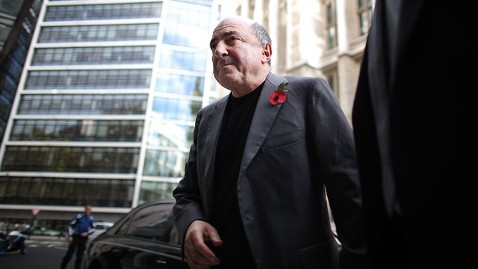Russian Oligarch Boris Berezovsky's Death 'Unexplained'

(Peter Macdiarmid/Getty Images)
Russian oligarch Boris Berezovsky was not killed by chemical or radioactive material, British police said today, but still calling the 67-year-old's death unexplained.
Berezovsky, once one of Russia's most visible and wealthiest men, was found dead Saturday at his home in Ascot, England, where he had been living since he left his homeland in 2000 as President Vladimir Putin's government was moving to bring criminal charges against him.
Thames Valley Police Scenes of Crime officers were carrying out a forensic investigation today at Berezovsky's estate.
"We are at the early stages of the investigation and we are retaining an open mind as we progress," Detective Chief Inspector Kevin Brown, the deputy senior investigating officer in the case, said.
"The investigation team are building a picture of the last days of Mr. Berezovsky's life, speaking to close friends and family to gain a better understanding of his state of mind. We are acutely aware of the level of interest into his death and are focused on conducting a thorough investigation as we would with any unexplained death."
News of Berezovsky's death sparked speculation that he might have been killed like ex-KGB agent Alexander Litvinenko, who died in 2006 after he was poisoned with polonium-210 while drinking tea at a London meeting.
Berezovsky openly accused Russian President Putin of personal involvement in the ex-spy's killing, and on his deathbed, Litvinenko blamed Putin for his death.
A year after Litvinenko's death, Berezovsky said Scotland Yard had warned him about a plot on his life, but British police never confirmed his claim.
Police today said any speculation about Berezovsky's death would be premature.
"It would be wrong to speculate on the cause of death until the post-mortem has been carried out," he said. "We do not have any evidence at this stage to suggest third-party involvement."
Police went to Berezovsky's home Saturday after receiving a phone call from an ambulance service that a man had been found dead at the Ascot home.
One of Berezovsky's employees told police he had called the ambulance service after finding the Russian's lifeless body on the floor of a bathroom. He said he'd become concerned because he hadn't seen Berezovsky since 10:30 the night before, and began searching the house. When he found the locked bathroom door, he forced it open and found Berezovsky, police said.
A paramedic with the ambulance service declared Berezovsky dead, police said.
Berezovsky was a supporter of former Russian President Boris Yeltsin, but quickly came into conflict with Putin, Yeltsin's successor.
He accused Putin's government of involvement in the apartment house bombings in Moscow and two other Russian cities that the government blamed on Chechen terrorists and used as a pretext for Russian troops to sweep into Chechnya for the second war there in half a decade.
When Russian authorities began moving to bring fraud, embezzlement, money laundering and other charges against him, Berezovsky said the criminal investigation was politically motivated, and he fled to Great Britain. Moscow sought his extradition, but the British refused.
Berezovsky continued to fund Russian opposition groups, in 2007 claiming he had given as much as $400 million to various organizations over the years, and even today a presidential spokesman said Putin considered Berezovsky an enemy.
"We know for certain that he spared no expense in support of processes, within Russia and beyond, that could be said to have been directed against Russia and Putin," spokesman Dmitry Peskov said on the independent cable television channel Rain. "He definitely was Putin's opponent and, unfortunately, not only his political opponent, but most likely in other dimensions as well."
Berezovsky's considerable fortune had reportedly been strained in recent years, first by a divorce settlement with his second wife, then when he lost a multibillion-pound High Court case against fellow Russian Roman Abramovich and was ordered to pay 35 million pounds (about $53 million) in legal costs.
He was also fighting a legal battle with his former partner, Elena Gorbunova, with whom he had two children and who claimed the businessman owed her millions. Legal fees for the case reportedly cost him 250,000 pounds (about $380,000) in just two months.
The Associated Press contributed to this report.